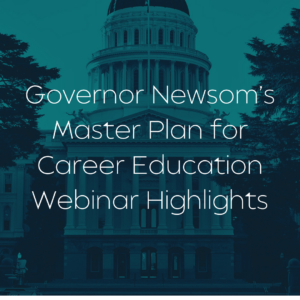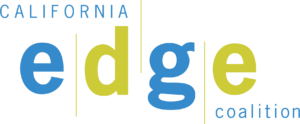
In case you missed the Governor’s Master Plan for Career Education webinar on January 24, 2024, provided below are some highlights from the event. Please note that this is an overview and not an endorsement of any recommendation. However, EDGE applauds the Governor in his efforts to make systematic changes in career education that centers Californians. We have an incredible opportunity here. The issues presented in the webinar have been prioritized by the EDGE Coalition for many years. The EDGE team is working closely with the Governor’s office to bring the voice of our coalition to this plan. We need to let them know what questions you have after watching the webinar. Be sure to check out the “how to get involved” section at the end of this page to submit your response to this question and for opportunities to stay involved.
Click here to visit the webpage where the webinar recording is posted.
Master Plan Timeline
- January – June 2024: Develop big ideas, the community can submit comments during this timeframe.
- July – September 2024: A draft plan will be released, and recommendations will be refined.
- October – November 2024: Taking action on the plan – review resources to implement the recommendations.
Regional Meetings
- March – April 2024. Meeting details can be found here.
Issues and Proposed Solutions
- Education and training programs are funded across different agencies, base funding, and special grants.
- Short-term funding streams incentivize pilots rather than structural change.
- Information is not readily available on outcomes, or those outcomes vary by population.
- Education/training is misaligned with the changing labor market.
- Potential Solutions:
- Establish a statewide career coordinating body made up of workforce, education and employer representatives that establishes joint plans and allocates state/federal funding related to career education.
- Distribute funds through regional career councils that include workforce, education and employer representatives who also coordinate regional employer engagement while protecting local employer partnerships.
- Provide information on regional labor markets.
- Implement incentive funding based on common measures that are developed by a State coordinating body. Data to be collected and maintained in the Cradle-2-Career Data System.
- Coordinate technical assistance at the regional level across service delivery systems to support regional plans while providing expertise for specific populations and education/training providers.
- Aligning education and workforce programs
- Students and workers don’t know which careers support economic mobility and how to train for those positions.
- Adults have few options for documenting skills built in non-academic contexts.
- Rural Californians have limited opportunities to earn degrees in high demand fields without having to move their families.
- There are not enough educators to teach critical skills.
- Potential solutions:
- Establish skills-based model pathways in priority sectors developed w/ K-12, higher ed systems, workforce training providers, and employers that include both technical and 21st century skills.
- Implement a universal K-12 curriculum that supports work-based learning starting in middle school.
- Provide adults with opportunities to explore career options.
- Establish a statewide strategy to prepare teachers and expand credentials.
- Coordinate enrollment management across education and workforce entities at the regional level, including stronger integration in adult education.
- Create a shared mechanism for evaluating equivalencies between learning systems so community college and dual enrollment courses are universally counted towards degrees offered at CSU and UC, and adults can receive credit for learning in noncredit workforce training and job settings.
- Work with employers to design a tool that allows learners to curate their academic and work experience to apply for jobs with employers that use skills-based hiring.
- Rebuild E-transcript CA to support universal transcript standards.
- There is value in staying tuned to the E-transcript Taskforce through the C2C Data System. The Jan 17, 2024 meeting recording is linked here, and upcoming meetings can be found here.
Work-based learning
- Work-based learning is often a volunteer opportunity, and not an option for those who must work while in school.
- Liability and coordination concerns impede employers from engaging in work-based learning.
- There are fewer work-based learning opportunities in non-technical pathways.
- Potential solutions
- Create universal definitions and standards for work-based learning.
- Create incentives for employer participation, including addressing liability issues.
- Ensure high school students can participate in work-based learning without compromising their ability to qualify for a 4-year college, like offering academic credit for their experience.
- Leverage regional career councils to coordinate with employers to provide work-based learning.
Education/training access and participation
- With the high cost of living in CA, people are juggling education and training with family obligations, debt, cost of full attendance.
- Adults and undocumented immigrants have fewer aid options and face systemic barriers to access public benefits.
- People with disabilities face unique barriers related to education, training, and employment.
- Potential solutions
- Strengthen mechanisms to encourage families to access benefits that support college savings.
- Increase access to financial support for both short term and long-term training.
- Create stronger systems for referring learners to social programs.
- Improve universal access to career pathways.
How to Get Involved
- Stay up to date on upcoming regional meetings, advisory committees, and submit your own recommendations/comments here.
- Join the Skills for CA Network! EDGE will keep the Network informed and engaged throughout this Master Plan journey! We will also provide opportunities to engage in budget and legislative advocacy. Joining the Network is free! Sign up here.
- Respond to EDGE’s survey – EDGE is working closely with the Governor’s office to bring the Coalition’s voice to the table throughout the development of the Master Plan. The Governor’s office wants to know what questions you have after watching the webinar. Click here to complete the survey.
